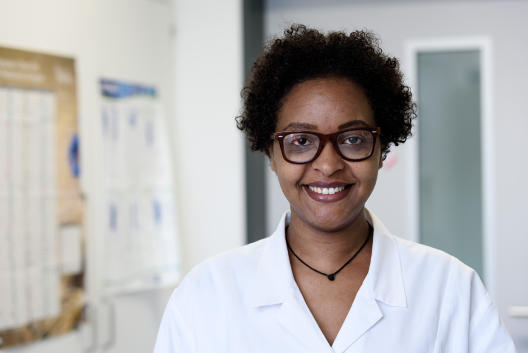Samples from the desert in her luggage

Lulit Tilahun Wolde, a biotechnologist, loves travelling. Her research regularly takes her to one of the hottest and most inhospitable places in the world: Dallol. Dallol is a region in Danakil Desert, north-east Ethiopia, where Lulit Wolde takes water and soil samples once a year among acid ponds and lava rock. Back home at Addis Ababa University in the country’s capital, she analyses microorganisms that have adapted and thrived in the extreme environmental conditions in Dallol. Lulit Wolde’s latest research trip brings her to a place with less extreme conditions, though: for two months she has been in Münster – as a visiting researcher at the University’s Cells-in-Motion Cluster of Excellence. She brought her samples from Dallol with her in order to make a more detailed analysis of them at molecular level in a German laboratory.
And how did she come to be in Münster? “It’s a long story”, she says. And one with an international dimension. Ultimately, a senior researcher at Central European Institute of Technology drew her German colleague’s attention to the research project being carried out by an Ethiopian PhD student, Lulit Wolde. The German researcher was Dr. Sebastian Leidel, team leader at the Cells-in-Motion Cluster of Excellence and the Max Planck Institute for Molecular Biomedicine in Münster. Together with his team he investigates various ribonucleic acids (RNA) in cells. These acids are important for making proteins from the genetic “building instructions” in a cell. When Sebastian Leidel heard about the work being done by the Ethiopian researcher, he was immediately interested and invited her to come to his laboratory in Germany. He wants to know how certain modifications in RNA enable the microorganisms to survive in extreme situations. “The invitation was an huge opportunity for me – I didn’t hesitate for long,” says Lulit Wolde. After the Cluster of Excellence had approved financial support for her, she packed her bags to embark on her first visit to Germany.
After two months she has visited several places of Münster. “I really like the city, it’s all so peaceful here,” she says. In the lab in Münster she is primarily extracting the RNA from the cells she brought with her from Ethiopia in order to analyse them by means of mass spectrometry. This is anything but straightforward, as the microorganisms are highly resistant – not only in nature, but also in experimental processes. Lulit Wolde is sure that she will have benefited from her visit to a German lab when she returns home after three months. “I’ve already been able to broaden my horizon and I’ve learned a lot about alternative technologies and how to use certain equipment,” says the 35-year-old researcher, who is the only woman in the team of researchers at her institute back home.
Although she likes it here in Münster, she is looking forward to going home, where her five-year-old daughter is waiting for her. She has been staying with Lulit Wolde’s mother in Addis Ababa. She is also keen to get back to her university, where she works as a lecturer. “I have a responsibility to pass on the knowledge I have acquired, as well as my enthusiasm for research, to the young students in Ethiopia,” she says. She hopes that she can continue to collaborate with the German research team after she has left. “The field we’re working on is so enormous. We’ve only just begun,” she says. And what plans does she have next? In February 2018 she will probably be going back to Dallol to do more research. Because of the very high temperatures of up to 46 degrees in the summer, the beginning of the year is the only time when researchers can go there to collect samples – samples which are bound to continue to attract attention in international labs.

